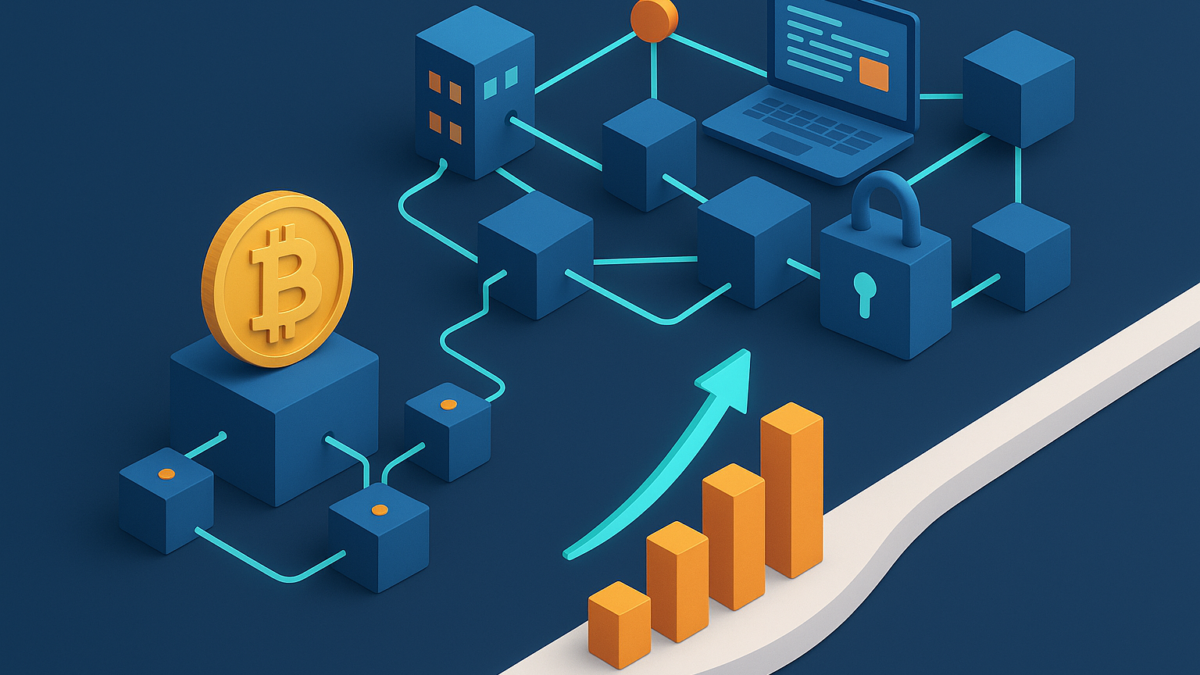Beyond Crypto: How Blockchain Is Powering the Next Wave of Business Innovation
Table of Contents
Blockchain is no longer just the buzzword behind Bitcoin. In 2025, it has evolved into a powerful backbone for business innovation, driving transparency, security, and automation across industries. From managing global supply chains to enabling smart contracts and digital identity verification, blockchain’s role extends far beyond finance it’s redefining how organizations build trust in a digital-first world.
The Evolution of Blockchain: From Cryptocurrency to Enterprise Catalyst
When blockchain first emerged, it was synonymous with cryptocurrency. But as the technology matured, enterprises began exploring its potential for decentralized data management, traceability, and secure automation.
Today, enterprise blockchain platforms such as Hyperledger Fabric, Quorum, and Corda are being used by global corporations to streamline business processes, eliminate intermediaries, and enhance efficiency.
Key advantages include:
- Immutable data records that prevent tampering or fraud.
- Decentralized verification that reduces dependency on third-party systems.
- Automated transactions through smart contracts.
This shift represents blockchain’s evolution from a speculative asset enabler to a trust infrastructure for the digital economy.
Real-World Applications Driving Transformation
Blockchain’s true power lies in its cross-industry adaptability. Businesses across multiple sectors are leveraging blockchain to build resilience, ensure compliance, and improve customer trust.
1. Supply Chain Transparency
Companies like IBM and Maersk are using blockchain to create end-to-end visibility across their supply networks. Every transaction, from raw material sourcing to delivery, is securely recorded — reducing counterfeiting, improving accountability, and ensuring ethical sourcing.
2. Financial Services
In banking, blockchain eliminates inefficiencies by reducing reconciliation times and enabling instant cross-border payments.
For example, Ripple’s payment protocol allows real-time international money transfers, cutting costs and improving transparency for both banks and customers.
3. Healthcare Data Security
Hospitals and research institutions are increasingly adopting blockchain to secure patient records. Through decentralized ledgers, data integrity is maintained, ensuring sensitive medical information remains tamper-proof while accessible to authorized personnel.
4. Intellectual Property & Digital Rights
Creative industries are using blockchain to protect ownership and ensure fair royalty distribution. Platforms like Audius and Ascribe leverage blockchain to authenticate creators’ rights, offering a transparent alternative to traditional licensing systems.
The Rise of Smart Contracts — Automating Trust
Smart contracts — blockchain-based programs that self-execute when conditions are met — are revolutionizing business operations.
They remove human error, reduce legal overheads, and accelerate workflows by executing predefined terms automatically.
Use cases include:
- Real estate: Seamless property transactions and ownership verification.
- Insurance: Automated claim settlements upon data validation.
- B2B partnerships: Transparent agreements without intermediaries.
By embedding trust into code, smart contracts redefine how enterprises engage with partners and customers — with trustless execution becoming the new norm.
Blockchain Meets AI — A Powerful Alliance
The convergence of AI and blockchain represents the next frontier in business innovation.
- Blockchain secures AI data sets, ensuring model transparency and fairness.
- AI enhances blockchain efficiency by automating validation and anomaly detection.
Together, these technologies enable organizations to analyze and store data responsibly, creating intelligent, ethical, and secure systems that can adapt to real-time business challenges.
Overcoming Challenges — Scalability and Regulation
Despite its promise, blockchain still faces hurdles. Scalability, energy efficiency, and regulatory ambiguity continue to challenge mainstream adoption.
However, 2025 has seen progress with Layer 2 solutions and green blockchain models that drastically reduce energy consumption. Governments worldwide are now drafting frameworks to regulate blockchain-based ecosystems — a sign of growing maturity in the space.
The Road Ahead — Building the Decentralized Future
As blockchain adoption accelerates, the focus is shifting toward interoperability, sustainability, and user-friendly integration.
Businesses that invest early in blockchain infrastructure are not just improving efficiency — they’re building trust-driven ecosystems capable of thriving in a decentralized digital economy.
Conclusion — Blockchain as the Trust Engine of the Digital Age
Blockchain’s journey from cryptocurrency enabler to a multi-industry innovation driver marks one of the most transformative tech evolutions of our time.
Its ability to ensure transparency, efficiency, and accountability makes it the trust engine powering the next era of business transformation.
In a world where data is currency and trust is the new commodity, blockchain stands as the foundation for a smarter, fairer, and more connected future.
Ready to amplify your brand’s reach and fuel growth with smarter strategies?
Explore how iTMunch’s B2B Content Syndication Services can help your business connect with high-quality, intent-driven leads and accelerate ROI through AI-powered distribution.
See Also: Generative AI in Whitepapers: How AI is Transforming B2B Research and Writing





